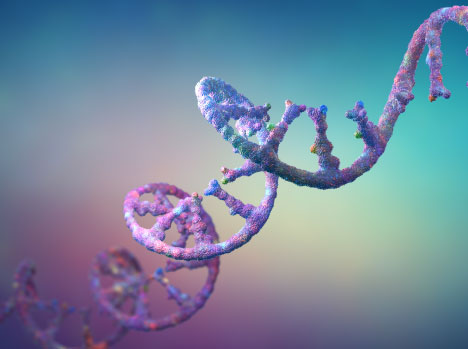Cytonus Therapeutics, a small biotech company north of San Diego, raised $11.7 million in Series A financing to engineer cells as delivery vessels for genetic medicines, including mRNA therapies and oncolytic viruses for cancer, Endpoints News has learned.
The unconventional approach flips the script on cell therapy. Rather than using the cell as a medicine itself, a partially-gutted cell transports a drug to a specified address in the body, thanks to molecular homing beacons appended to its surface.
“In many ways, it behaves like a biological drone. It’s an entirely new category of drug delivery,” Cytonus co-founder and CEO Remo Moomiaie-Qajar said in an exclusive interview. “We are not a cell therapy company.”
The idea comes from co-founder Richard Klemke, a researcher at the University of California, San Diego, who has engineered cells dubbed Cargocytes that use chemokine receptors or adhesion molecules displayed on their surface to act like a biological GPS that homes in on cancer and releases a drug.
The defunct Rubius Therapeutics once had ambitions to use red blood cells as living vessels that transported therapies for cancer or rare diseases, but lackluster clinical results ultimately led the company to shut down earlier this year. Cytonus believes its approach will be better.
“Other approaches like nanoparticles, exosomes, even red blood cells, are all passive ways to deliver a product. They circulate in the bloodstream and are very inefficient at getting out and penetrating deep into tissues,” Moomiaie-Qajar said. “The Cargocyte is different. It’s an active transporter, better at homing and migration than anything else.”
Cells as protein factories and Trojan horses
The Carlsbad, CA-based startup has been working on Cargocytes since 2018, supported by six grants from the National Institutes of Health and one from the California Institute for Regenerative Medicine. Partners Investment led the new funding round, with biotech investor John Ballantyne, Proxima Ventures and the Gemseki Fund chipping in, too.
The influx of cash will help the startup bring its first therapy into clinical trials in roughly 12 to 18 months, Moomiaie-Qajar said. The company has several programs underway using its Cargocytes to deliver either mRNA or oncolytic viruses to glioblastoma and metastatic solid tumors, but it hasn’t decided which of those cargos or indications it will test first.
While other companies are using mRNA to temporarily reprogram immune cells to attack cancer in a twist on CAR-T cell therapy, Cytonus stands apart for its ambition to use cells as an alternative to lipid nanoparticles to get mRNA therapies encoding anticancer proteins into tumors.
“The Cargocyte becomes an in vivo protein factory,” Moomiaie-Qajar said. After an intravenous infusion in animals, the cells produce high levels of a protein in the target tumor, providing a new way to deliver potent immune-stimulating cytokines that may be too toxic to deliver systemically, he added.
The startup is also using its Cargocytes as a Trojan horse for sneaking oncolytic viruses past the immune system and into tumors, where they can wreak havoc. Many companies developing the engineered viruses are just directly injecting them into tumors, but Cytonus’ approach will allow them to be infused systemically.
Cytonus is using mesenchymal stem cells in its first generation of therapies and has developed a way to “gently” remove the nucleus of each cell through centrifugation, essentially stripping it of its brain so that the cell doesn’t start acting in unwanted ways, Moomiaie-Qajar said. He hopes the approach will be useful for delivering many cargos to many parts of the body.
“If we can figure out how to deliver one thing to a target cell or tissue, we can deliver 1,000 things to that cell or tissue,” he said.

Check out our mRNA service to expedite your vaccine research
PackGene Biotech is a world-leading CRO and CDMO, excelling in AAV vectors, mRNA, plasmid DNA, and lentiviral vector solutions. Our comprehensive offerings span from vector design and construction to AAV, lentivirus, and mRNA services. With a sharp focus on early-stage drug discovery, preclinical development, and cell and gene therapy trials, we deliver cost-effective, dependable, and scalable production solutions. Leveraging our groundbreaking π-alpha 293 AAV high-yield platform, we amplify AAV production by up to 10-fold, yielding up to 1e+17vg per batch to meet diverse commercial and clinical project needs. Moreover, our tailored mRNA and LNP products and services cater to every stage of drug and vaccine development, from research to GMP production, providing a seamless, end-to-end solution.
Related News
Genethon Highlights Key Developments in Gene Therapy Research
December 19, 2024 – Paris, France – Genethon, a pioneering non-profit gene therapy research and development organization founded by the French Muscular Dystrophy Association (AFM-Telethon), has unveiled significant progress in its clinical and scientific endeavors as...
[2024/12/20] Gene and Cell Therapy- weekly digest from PackGene
FeaturedNewsArticlesPackGene's NewsletterReceive the latest news and insights to your inbox.About PackGenePackGene Biotech is a world-leading CRO and CDMO, excelling in AAV vectors, mRNA, plasmid DNA, and lentiviral vector solutions. Our comprehensive offerings span...
Sangamo and Astellas Collaborate to Advance Neurological Gene Therapies Using AAV Capsid Technology
Sangamo Therapeutics, Inc. (Nasdaq: SGMO), a leader in genomic medicine, and Astellas Pharma Inc. (TSE: 4503), a global innovator in life sciences, have partnered under a new license agreement. This collaboration centers around Sangamo’s cutting-edge neurotropic AAV...
Inceptor Bio and GRIT Bio Announce Strategic Partnership to Advance IB-T101, a Next-Generation Solid Tumor CAR-T Utilizing the OUTLAST™ Platform
SHANGHAI and MORRISVILLE, N.C., Dec. 18, 2024 /PRNewswire/ -- Inceptor Bio, a leading innovator in cell therapy, and GRIT Bio, a clinical-stage immunotherapy developer, today announced a strategic partnership to advance IB-T101, a potentially best-in-class CAR-T...
Related Services

